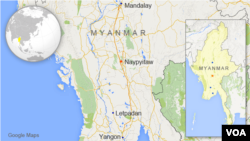A Rohingya refugee from Myanmar is preparing to go home three months after he arrived in Cambodia as part of a controversial resettlement deal with Australia.
Kem Sarin, head of the Interior Ministry's refugee program, told reporters Monday the man had contacted the Myanmar Embassy with a request to return. Once the embassy makes an official announcement, “Cambodia will issue an exit visa,” he said. “The refugee will be able to leave later to his motherland.”
Kem Sarin said the refugee’s decision would not impact the broader agreement between Cambodia and Australia to bring in more refugees currently held on the South Pacific island of Nauru.
He provided no motives for the refugee’s decision to return to Myanmar, also known as Burma, where many Rohingya people, called Bengali by the government in Yangon, accuse officials of repression.
Kristin Dadey, a migrant assistance specialist with the International Organization of Migration (IOM), declined to comment on the return, citing confidentiality for the refugee.
Meanwhile, it remains unclear how many more refugees might come to Cambodia through the agreement. The deal, for which Cambodia received more than $40 million in aid from Australia, has been sharply criticized as counter to international asylum tenets.
Cambodian officials have said they currently have no plans for more, but Australian officials say the agreement is still in place. There have been no reports the other three refugees in Cambodia, all from Iran, have plans to leave.
Under the controversial deal, Australia agreed to pay all resettlement costs for a year. Those who accept transfer from Nauru will receive thousands of dollars in cash, language and skills training, and health insurance.
Am Sam Ath, technical supervisor for the rights group Licadho, said the Rohingya man's decision to return to Myanmar, a country he had fled, ought to be a message to other refugees considering resettlement in Cambodia, a country with its own rights abuse and economic problems.
“We still have to improve all these things first, before we accept other refugees,” he said. “We should not look at money as the big factor. We can’t accept refugees without making thorough considerations of their lives and their rights.”
More than 600 refugees and asylum-seekers are thought to be on Nauru; hundreds more are in detention on Papua New Guinea’s Manus Island under an arrangement with Australia. Most are believed to be from countries in South Asia and the Middle East.
The proposed resettlement deal was the subject of months of secret negotiations, and has drawn criticism from rights organizations, church groups and opposition politicians in both countries.
The U.N. refugee agency says it undermines the principles of the refugee convention, to which both nations are a signatory.
This report was produced in collaboration with the VOA Khmer service.




